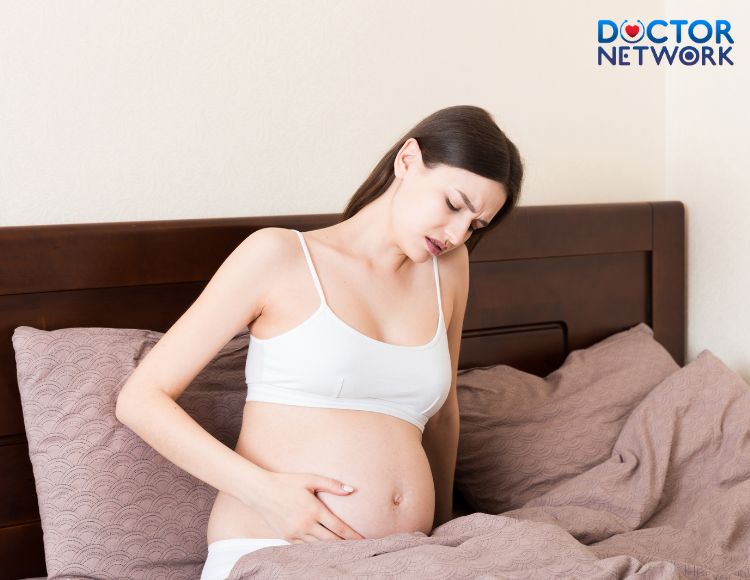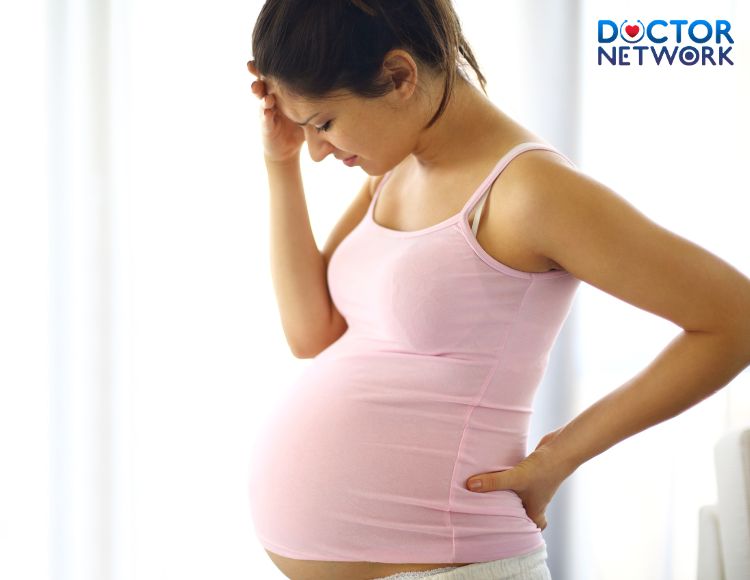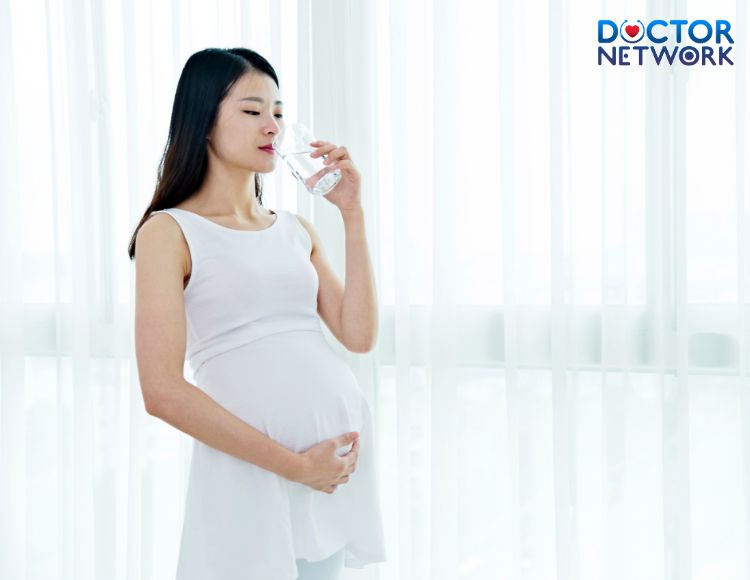Pregnancy, especially in the first trimester, is a period of significant bodily changes for women, leading to various unfamiliar sensations, including lower abdominal pain. This article aims to help you understand “lower abdominal pain in the first trimester of pregnancy“, distinguish between normal signs and when to seek immediate medical attention.
Why does “lower abdominal pain in the first trimester of pregnancy“?
Lower abdominal pain, whether dull or sharp, during the first trimester often worries expectant mothers. However, most cases are due to natural physiological changes:
Uterine Growth: As the fetus grows, the uterus expands, stretching the supporting ligaments and causing abdominal pain, especially during physical activity.

As the fetus grows, the uterus expands, stretching the supporting ligaments and causing abdominal pain
Implantation: When the fertilized egg moves into the uterus and attaches to the uterine wall, it can cause a mild, cramping sensation in the lower abdomen.
Digestive Issues: Pregnancy hormones, particularly progesterone, slow down digestion, leading to constipation, bloating, increased abdominal pressure, and pain.
Other causes to consider
Although rare, some cases of “lower abdominal pain in the first trimester of pregnancy” require immediate medical intervention:
Miscarriage: If the pain is accompanied by vaginal bleeding, seek medical attention immediately as it may indicate a miscarriage.
Ectopic Pregnancy: This occurs when the fertilized egg implants outside the uterus, such as in the fallopian tubes. An ectopic pregnancy can rupture, causing severe pain and internal bleeding, necessitating emergency surgery.
Recognizing warning signs and when to see a doctor
Pregnant women should consult a doctor immediately if “lower abdominal pain in the first trimester of pregnancy” is accompanied by:
- Severe, worsening pain, especially if it is localized to one side of the lower abdomen
- Abnormal vaginal bleeding
- Dizziness, fainting
- Fever, nausea, vomiting

Fever, nausea, vomiting
Safe ways to reduce “lower abdominal pain in the first trimester of pregnancy”
If the abdominal pain is not severe, expectant mothers can try the following methods to alleviate discomfort:
- Rest and relaxation, avoiding strenuous activity
- Warm compresses on the lower abdomen
- Eating easily digestible foods, avoiding greasy, spicy foods, and carbonated beverages
- Drinking plenty of water

Reduce “lower abdominal pain in the first trimester of pregnancy” – Drinking plenty of water
If these methods do not improve the condition, consult a doctor for further advice.
Expert advice
Obstetric experts emphasize that most cases of “lower abdominal pain in the first trimester of pregnancy” are not dangerous. However, pregnant women should remain vigilant, monitoring the intensity and nature of the pain and any associated symptoms, and seek medical attention promptly if needed. Regular prenatal check-ups are also crucial for monitoring the health of both mother and baby.
Frequently asked questions about “lower abdominal pain in the first trimester of pregnancy”
Here are five common questions and answers regarding “lower abdominal pain in the first trimester of pregnancy”
- Is “lower abdominal pain in the first trimester of pregnancy” dangerous?
Most cases are due to natural physiological changes such as uterine expansion or implantation. However, if accompanied by severe pain, vaginal bleeding, high fever, or dizziness, seek medical attention immediately to rule out miscarriage or ectopic pregnancy.
- How can you differentiate between lower abdominal pain due to pregnancy and menstrual cramps?
Menstrual cramps typically occur right before or during a menstrual period, with dull or cramping pain focused in the lower abdomen. Lower abdominal pain during pregnancy can occur at any time in the first trimester and may be more widespread, accompanied by symptoms like breast tenderness, fatigue, and nausea.
- Does lower abdominal pain during pregnancy affect the baby?
Mild, intermittent pain usually does not harm the baby. However, severe, persistent pain, especially with warning signs, can be dangerous and requires immediate medical attention.
- Is “lower abdominal pain in the first trimester of pregnancy” a sign of having a baby boy?
There is no scientific evidence linking pregnancy symptoms, such as lower abdominal pain, to the baby’s gender. Ultrasound is the most accurate method for determining the baby’s gender.
- How can I reduce lower abdominal pain during pregnancy?
Rest, avoid heavy lifting, and excessive physical activity, use warm compresses on the lower abdomen, stay hydrated, and adjust your diet to avoid foods that cause bloating and constipation. Consult a doctor if symptoms persist or worsen.
Scientific evidence on “lower abdominal pain in the first trimester of pregnancy”
Here are some scientific findings on “lower abdominal pain in the first trimester of pregnancy”
- A 2020 study from Harvard Medical School found that progesterone increases relaxin levels, a hormone that relaxes uterine muscles, leading to abdominal pain.
- According to Mayo Clinic, elevated progesterone levels in the first trimester contribute to abdominal pain.
- A 2015 study in “Ultrasound in Obstetrics & Gynecology” identified the stretching of the round ligaments as a common cause of abdominal pain.
- A 2017 study in “BJOG: An International Journal of Obstetrics and Gynaecology” found that 80% of women who miscarried experienced severe abdominal pain.
- “The Lancet” published a 2018 study showing that 95% of women with ectopic pregnancies had severe abdominal pain.
Understanding the causes of “lower abdominal pain in the first trimester of pregnancy” can help alleviate concerns and ensure appropriate management. Always listen to your body and consult a doctor for the best advice and support for a healthy pregnancy.
References:
https://www.medicalnewstoday.com/articles/low-belly-pain-when-pregnant
https://www.nhs.uk/pregnancy/related-conditions/common-symptoms/stomach-pain/
Kiểm Duyệt Nội Dung
More than 10 years of marketing communications experience in the medical and health field.
Successfully deployed marketing communication activities, content development and social networking channels for hospital partners, clinics, doctors and medical professionals across the country.
More than 6 years of experience in organizing and producing leading prestigious medical programs in Vietnam, in collaboration with Ho Chi Minh City Television (HTV). Typical programs include Nhật Ký Blouse Trắng, Bác Sĩ Nói Gì, Alo Bác Sĩ Nghe, Nhật Ký Hạnh Phúc, Vui Khỏe Cùng Con, Bác Sỹ Mẹ, v.v.
Comprehensive cooperation with hundreds of hospitals and clinics, thousands of doctors and medical experts to join hands in building a medical content and service platform on the Doctor Network application.

























